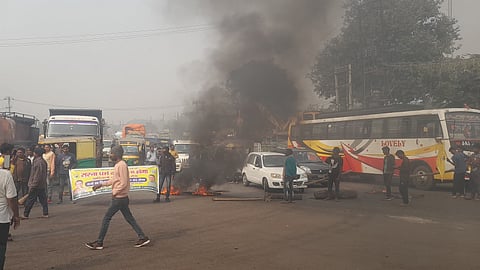
Ranchi- In a sweeping demonstration of unity and determination, tribal communities across five states—Jharkhand, Odisha, West Bengal, Bihar, and Assam—participated in a symbolic Bharat Bandh, demanding recognition for the Sarna Dharma Code. On December 30, the protests, organized by Adivasi Sengel Abhiyan and supported by various tribal organizations, saw the tribal populace taking to the streets in a fervent call for the acknowledgment of their distinct religious identity.
The movement led by former MP and National President of Adivasi Sengel Abhiyan, Salkhan Murmu, joined forces with various tribal organizations, including the Central Sarna Committee Ranchi, Tribal Students Union Ranchi, All India Tribal Development Council Ranchi, Sarna Dharma Coordination Committee Khunti, Adivasi Ho Samaj Mahasabha, Seraikela, and Raji Padha.
The tribal movement orchestrated rail-road blocks across five states, including prayer meetings and demonstrations in Lohardaga and other key locations. A noteworthy aspect of this widespread protest is the rail chakka jam, effectively carried out at 15 strategic locations including Munger and Katihar districts in Bihar, Purliya, Malda , Hugli in West Bengal, Sarikela, Dumka, Pakud in Jharkhand and other areas.
Jairam Soren, the Bokaro Zonal Coordinator for Sengel, stressed on the Sarna Dharma Code's significance as the lifeline for around 15 crore nature-worshipping tribals in India. Accusing major political parties, including Congress and BJP, of violating the religious freedom of tribal communities, Soren highlighted the historical context, noting that the provision recognizing the Sarna Dharma Code existed until the 1951 census but was later removed. He further alleged that the current government seeks to forcibly assimilate tribals into Hinduism, describing this as a constitutional crime.
Savita Marandi, General Secretary of Sengel Mahila Morcha in Chas Block, expressed dissatisfaction with the outcomes of high-profile visits by the Prime Minister and the President on the issue of Sarna Dharma Code recognition. Angered by what she sees as the deprivation of religious freedom for nature-worshipping tribals, Marandi emphasized the need for safeguarding and promoting significant religious places integral to tribal culture, such as Marang Suru, Luguburu, and Ayodhya Suru.
In response to these grievances, Adivasi Sengel Abhiyan, in collaboration with other tribal organizations, had called for a symbolic Bharat Bandh and Rail-Road Chakka Jam on Saturday. The protests disrupted normal life across multiple districts as tribal communities voiced their demand for the official recognition of Sarna Dharma Code.
The impact of the Bharat Bandh was felt prominently in various districts, with roads and railway tracks blocked by enthusiastic tribal protesters. The movement garnered support from diverse tribal groups, with calls for unity and the creation of a distinct tribal identity within the Indian socio-religious landscape.
ASA president Salkhan Murmu claimed that the bandh evoked "good response not only in Jharkhand, but also in other parts of Eastern India including West Bengal and Odisha".
Sarna, the faith of tribal communities, centers around worshipping nature like mountains and forests. The National Commission for Scheduled Tribes recommends recognizing Sarna as a distinct religion in the census, a demand echoed by Adivasi Sengel Abhiyan. Murmu highlights that despite 50 lakh tribals identifying as 'Sarna' in the 2011 Census, the religion lacks separate status, unlike Jainism. In 2020, the Jharkhand Assembly unanimously called for Sarna's recognition as a distinct religion.
The Bharat Bandh affected train services in the Chakradharpur railway division, resulting in cancellations and changes to train routes. Trains like Tata-Badampahar Memu Passenger, Tata-Ara Express, and Tata Dhanbad Swarnarekha Express were canceled. The Jhargram-Purulia passenger train was stopped at Tata, causing inconvenience to passengers. Vande Bharat Express took a different route through Muri, and Sampark Kranti Express changed its path via Hijri. The Bilaspur-Patna Express, which usually goes through Anara, was redirected via Muri.
Travelers from Tatanagar faced difficulties due to train cancellations, especially those boarding the Tata-Ara train in the morning. Passengers expressed dissatisfaction, emphasizing the need for earlier communication about cancelled trains.
The Railway Protection Force (RPF) and Railway Police kept a close watch at Tatanagar station, patrolling all platforms. Thankfully, there were no reports of railway track blockages in the area, providing relief to the Railway Police.
Meanwhile, commenting on the Adivasi Sengel Abhiyan's move, Union Tribal Affairs Minister Arjun Munda said people will face a lot of inconvenience if such disruptions continue.
"The demand for Sarna religion should have been raised at an appropriate forum instead of harassing common people in this manner," Munda said.
Also Read-
You can also join our WhatsApp group to get premium and selected news of The Mooknayak on WhatsApp. Click here to join the WhatsApp group.